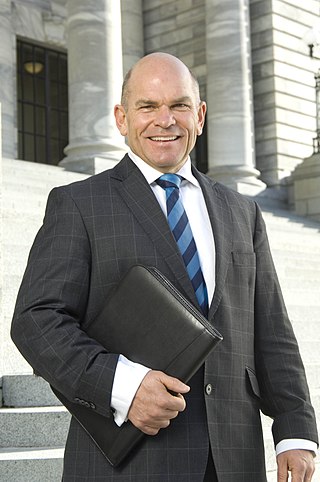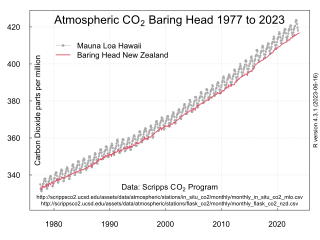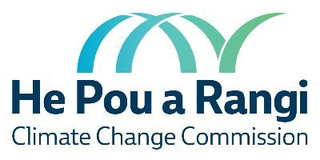The Emissions Trading Scheme Review Committee was a special committee of the New Zealand Parliament which conducted a review of the Fifth Labour Government's Emissions Trading Scheme between December 2008 and late August 2009. [1]
Immediately after the New Zealand general election, 2008, the new National-led government announced that, in accordance with its coalition agreement with the ACT Party, it would delay implementation of the New Zealand Emissions Trading Scheme ("NZ ETS") as established by the Labour Government in the Climate Change Response (Emissions Trading) Amendment Act 2008 and set up the Emissions Trading Scheme Review Committee to review the NZ ETS. [2] In November 2008, the National Business Review reported that an international carbon trading company, EcoSecurities Group, had postponed opening an office in New Zealand because of the National Government's decision to delay the NZ ETS. [3]
The National-ACT coalition agreement mentioned reviewing the emissions trading scheme and possible alternatives to it, as well as "hear[ing] competing views on the scientific aspects of climate change" and considering whether responding to climate change is economically worthwhile. [4] New Zealand Herald journalist Brian Rudman commented that National's approach was "indulging Mr Hide in his fruitcake views on global warming". [5]
However, the final terms of reference, released on 9 December 2008, [6] were to: "identify the central/benchmark projections which are being used as the motivation for international agreements to combat climate change; and consider the uncertainties and risks surrounding those projections". The most economic-oriented term was to: "consider the impact on the New Zealand economy and New Zealand households of any climate change policies, having regard to the weak state of the economy, the need to safeguard New Zealand's international competitiveness, the position of trade-exposed industries, and the actions of competing countries". [7]
On 31 August 2009, the Emissions Trading Scheme Review Committee reported back to Parliament, [1] with Climate Change Issues Minister Nick Smith stating that the National-led Government was still intending to amend the NZ ETS. [8] The report consisted of minority reports from the New Zealand Labour Party, the Green Party, the Māori Party and the ACT Party. [9] The chairman of the committee, Peter Dunne, described report as a 'middle road' through 'complex and contentious' material. [10]
According to NZ Law firm Simpson Grierson, although the review report made 34 recommendations on climate change policy, it did not make any specific recommendations to amend either the NZ ETS or the Climate Change Response Act 2002. Simpson Grierson considered that the key findings of the review were that: [11]
Rod Oram described the recommendations made by the report as "obvious, indecisive or generic". Oram considered that the politics of the review were to provide a "sop to the ACT party and a time-waster for National". Oram concluded that the review had 'failed to make any serious contribution towards improving the working of the ETS'. [9]
On 14 September 2009, the National Government announced that it had reached an agreement with the Māori Party about revisions to the NZ ETS. [12] On 24 September 2009, the Climate Change Response (Moderated Emissions Trading) Amendment Bill had its first reading in Parliament. [13]

The Kyoto Protocol (Japanese: 京都議定書, Hepburn: Kyōto Giteisho) was an international treaty which extended the 1992 United Nations Framework Convention on Climate Change (UNFCCC) that commits state parties to reduce greenhouse gas emissions, based on the scientific consensus that global warming is occurring and that human-made CO2 emissions are driving it. The Kyoto Protocol was adopted in Kyoto, Japan, on 11 December 1997 and entered into force on 16 February 2005. There were 192 parties (Canada withdrew from the protocol, effective December 2012) to the Protocol in 2020.

Nicolas Rex Smith is a New Zealand politician who served as a Member of Parliament (MP) for the National Party from 1990 to 2021. He served as a Cabinet minister, holding various posts including Minister for Building and Housing, Minister for the Environment, Minister for Climate Change Issues, and Minister of Local Government. For a brief time between October and November 2003 he was the deputy leader of the National Party, then in opposition under Don Brash.

Rodney Philip Hide is a former New Zealand politician of the ACT New Zealand party. Hide was a Member of Parliament for ACT from 1996 until 2011, was ACT's leader between 2004 and 2011, and represented the Epsom constituency from 2005 to 2011. In the Fifth National Government, Hide was Minister of Local Government, Associate Minister of Commerce and Minister of Regulatory Reform until 2011.

The European Union Emissions Trading System is a carbon emission trading scheme which began in 2005 and is intended to lower greenhouse gas emissions by the European Union countries. Cap and trade schemes limit emissions of specified pollutants over an area and allow companies to trade emissions rights within that area. The EU ETS covers around 45% of the EUs greenhouse gas emissions.
Flexible mechanisms, also sometimes known as Flexibility Mechanisms or Kyoto Mechanisms, refers to emissions trading, the Clean Development Mechanism and Joint Implementation. These are mechanisms defined under the Kyoto Protocol intended to lower the overall costs of achieving its emissions targets. These mechanisms enable Parties to achieve emission reductions or to remove carbon from the atmosphere cost-effectively in other countries. While the cost of limiting emissions varies considerably from region to region, the benefit for the atmosphere is in principle the same, wherever the action is taken.
The CRC Energy Efficiency Scheme was a mandatory carbon emissions reduction scheme in the United Kingdom which applied to large energy-intensive organisations in the public and private sectors. It was estimated that the scheme would reduce carbon emissions by 1.2 million tonnes of carbon per year by 2020. In an effort to avoid dangerous climate change, the British Government first committed to cutting UK carbon emissions by 60% by 2050, and in October 2008 increased this commitment to 80%. The scheme has also been credited with driving up demand for energy-efficient goods and services.

The Carbon Pollution Reduction Scheme was a cap-and-trade emissions trading scheme for anthropogenic greenhouse gases proposed by the Rudd government, as part of its climate change policy, which had been due to commence in Australia in 2010. It marked a major change in the energy policy of Australia. The policy began to be formulated in April 2007, when the federal Labor Party was in Opposition and the six Labor-controlled states commissioned an independent review on energy policy, the Garnaut Climate Change Review, which published a number of reports. After Labor won the 2007 federal election and formed government, it published a Green Paper on climate change for discussion and comment. The Federal Treasury then modelled some of the financial and economic impacts of the proposed CPRS scheme.

The Fifth Labour Government of New Zealand was the government of New Zealand from 10 December 1999 to 19 November 2008. Labour Party leader Helen Clark negotiated a coalition with Jim Anderton, leader of the Alliance Party. While undertaking a number of substantial reforms, it was not particularly radical compared to previous Labour governments.

Carbon emission trading (also called emission trading scheme (ETS) or cap and trade) is a type of emission trading scheme designed for carbon dioxide (CO2) and other greenhouse gases (GHG). It is a form of carbon pricing. Its purpose is to limit climate change by creating a market with limited allowances for emissions. This can lower competitiveness of fossil fuels and accelerate investments into low carbon sources of energy such as wind power and photovoltaics. Fossil fuels are the main driver for climate change. They account for 89% of all CO2 emissions and 68% of all GHG emissions.

Climate change in New Zealand involves historical, current and future changes in the climate of New Zealand; and New Zealand's contribution and response to global climate change. Summers are becoming longer and hotter, and some glaciers have melted completely and others have shrunk. In 2021, the Ministry for the Environment estimated that New Zealand's gross emissions were 0.17% of the world's total gross greenhouse gas emissions. However, on a per capita basis, New Zealand is a significant emitter, the sixth highest within the Annex I countries, whereas on absolute gross emissions New Zealand is ranked as the 24th highest emitter.
The Fifth National Government of New Zealand was the government of New Zealand for three parliamentary terms from 19 November 2008 to 26 October 2017. John Key served as National Leader and Prime Minister until December 2016, after which Bill English assumed the premiership until the National Government's defeat following the October 2017 government-forming negotiations.
The Asia-Pacific Emissions Trading Forum (AETF) was an information service and business network dealing with domestic and international developments in emissions trading policy in Australia and the Asia-Pacific region. The AETF was originally called the Australasian Emissions Trading Forum, and was founded in 1998 under the auspices of the Sydney Futures Exchange following a proposal from Beck Consulting Services. From 2001 until 2011 the AETF published the AETF Review, held regular member meetings and convened numerous events and conferences. The AETF Review was published six times per year and included original articles on emissions trading developments and related topics.

The New Zealand Emissions Trading Scheme is an all-gases partial-coverage uncapped domestic emissions trading scheme that features price floors, forestry offsetting, free allocation and auctioning of emissions units.

The Climate Change Response Act 2002 is an Act of Parliament passed by the government of New Zealand.
The Climate Change Response Amendment Act 2008 was a statute enacted in September 2008 by the Fifth Labour Government of New Zealand that established the first version of the New Zealand Emissions Trading Scheme, a national all-sectors all-greenhouse gases uncapped and highly internationally linked emissions trading scheme.

The Clean Energy Act 2011 was an Act of the Australian Parliament, the main Act in a package of legislation that established an Australian emissions trading scheme (ETS), to be preceded by a three-year period of fixed carbon pricing in Australia designed to reduce carbon dioxide emissions as part of efforts to combat global warming.
A carbon pricing scheme in Australia was introduced by the Gillard Labor minority government in 2011 as the Clean Energy Act 2011 which came into effect on 1 July 2012. Emissions from companies subject to the scheme dropped 7% upon its introduction. As a result of being in place for such a short time, and because the then Opposition leader Tony Abbott indicated he intended to repeal "the carbon tax", regulated organizations responded rather weakly, with very few investments in emissions reductions being made. The scheme was repealed on 17 July 2014, backdated to 1 July 2014. In its place the Abbott government set up the Emission Reduction Fund in December 2014. Emissions thereafter resumed their growth evident before the tax.

Theresa Griffin is a British politician who served as a Labour Party Member of the European Parliament (MEP) for North West England from 2014 to 2020. In the European Parliament, Griffin was aligned with the Progressive Alliance of Socialists and Democrats (S&D).
South Korea’s Emissions Trading Scheme (KETS) is the second largest in scale after the European Union Emission Trading Scheme and was launched on January 1, 2015. South Korea is the second country in Asia to initiate a nationwide carbon market after Kazakhstan. Complying to the country’s pledge made at the Copenhagen Accord of 2009, the South Korean government aims to reduce its greenhouse gas (GHG) emissions by 30% below its business as usual scenario by 2020. They have officially employed the cap-and-trade system and the operation applies to over 525 companies which are accountable for approximately 68% of the nation’s GHG output. The operation is divided up into three periods. The first and second phases consist of 3 years each, 2015 to 2017 and 2018 to 2020. The final phase will spread out over the next 5 years from 2021 to 2025.

The Climate Change Commission is an independent Crown entity that advises the New Zealand Government on climate change policy and monitors the government's progress towards New Zealand's emission reduction goals within the framework of the Climate Change Response Amendment Act. The Commission was established as the successor to the Interim Climate Change Committee following the passage of the Zero Carbon Act in November 2019.
Committee chair Peter Dunne today described the resulting report as a 'middle road' through some 'complex and contentious' material.